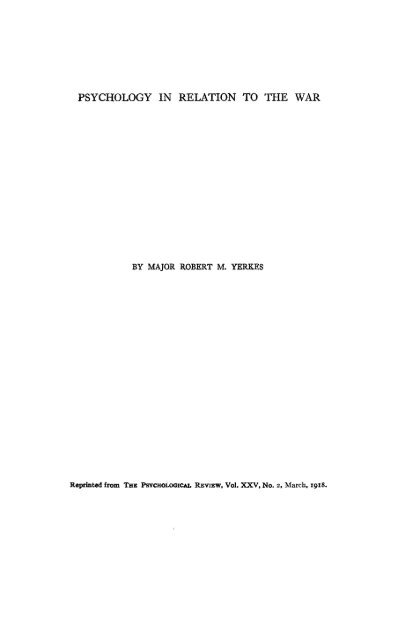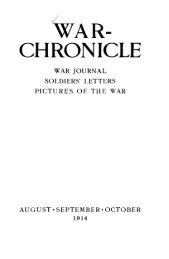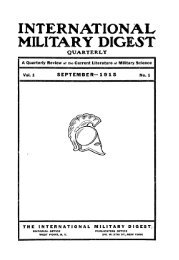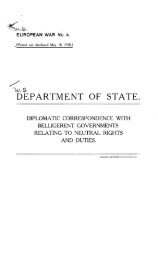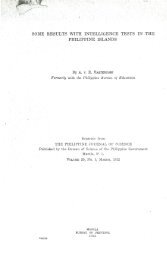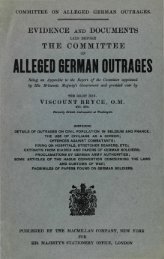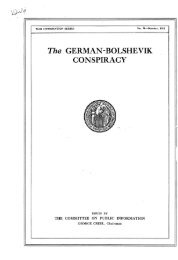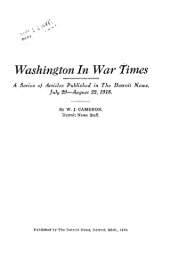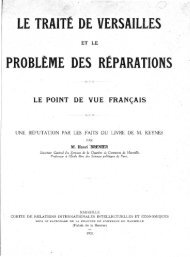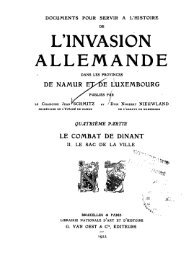PSYCHOLOGY IN RELATION TO THE WAR
PSYCHOLOGY IN RELATION TO THE WAR
PSYCHOLOGY IN RELATION TO THE WAR
You also want an ePaper? Increase the reach of your titles
YUMPU automatically turns print PDFs into web optimized ePapers that Google loves.
<strong>PSYCHOLOGY</strong> <strong>IN</strong> <strong>RELATION</strong> <strong>TO</strong> <strong>THE</strong> <strong>WAR</strong><br />
BY MAJOR ROBERT M. YERKES<br />
Reprinted from <strong>THE</strong> PSYCHOLOGICAL REVIEW, Vol. XXV, No. 2, March, 1918.
[Reprinted from <strong>THE</strong> PSYCHOLOGICAL REVIEW, Vol. XXV, No. 2, March, 1918.]<br />
<strong>PSYCHOLOGY</strong> <strong>IN</strong> <strong>RELATION</strong> <strong>TO</strong> <strong>THE</strong> <strong>WAR</strong> 1<br />
BY MAJOR ROBERT M. YERKES,<br />
Sanitary Corps, National Army, Surgeon General's Office, Washington, D. C.<br />
It is my agreeable duty as President of the American<br />
Psychological Association to present to you in outline the<br />
history of the organizing of psychological military service.<br />
I shall limit myself strictly to the activities of the present<br />
year, 1917.<br />
In Europe, psychologists have served conspicuously in<br />
the great war but psychology has done little. In this country,<br />
for the first time in the history of our science, a general<br />
organization in the interests of certain ideal and practical<br />
aims has been effected. Today American psychology is<br />
placing a highly trained and eager personnel at the service of<br />
our military organizations. We are acting not individually<br />
but collectively on the basis of common training and common<br />
faith in the practical value of our work. At the first call<br />
American psychologists responded promptly and heartily,<br />
therefore the length to which the development of our work<br />
has progressed and the measure of service which has been<br />
attained.<br />
On April 6, 1917, in connection with a meeting of a group<br />
of psychologists known as the "Experimentalists" which was<br />
at the time being held in Emerson Hall, Cambridge, Massachusetts,<br />
a session was arranged by Messrs. Langfeld and<br />
Yerkes with the approval of the chairman of the meeting,<br />
Mr. Titchener, for discussion of the relations of psychology<br />
to national defense. Captain Bowen, instructor in military<br />
1 Address of the President before the American Psychological Association, Pittsburgh<br />
Meeting, December, 1917.<br />
85
86 ROBERT M. YERKES<br />
science and tactics, Harvard University, attended this meeting<br />
and made valuable suggestions concerning the possible<br />
rôle of psychology. Notable suggestions were made also by<br />
Messrs. Bingham, Troland, Langfeld, Doll, Reeves, Burtt,<br />
Wells and others. At the conclusion of the discussion, which<br />
clearly indicated confidence in the preparedness of psychology<br />
for military service, it was moved by Mr. Warren that a<br />
committee consisting of Messrs. Yerkes, Bingham and Dodge<br />
be appointed to gather information concerning the possible<br />
relations of psychology to military affairs and to further the<br />
application of psychological methods to military problems.<br />
On the evening of the same day at an informal conference<br />
of the members of this committee (Mr. Bingham's place being<br />
taken by Mr. Ogden), it was decided that the matter should<br />
be placed before the council of the American Psychological<br />
Association, so that our national organization, rather than<br />
any restricted or local group, might take action. Following<br />
this conference, the president of the American Psychological<br />
Association prepared the following letter, which on April 7<br />
was dispatched to the members of the council of the association.<br />
EMERSON HALL, CAMBRIDGE, MASS.<br />
April 6, 1917<br />
To <strong>THE</strong> COUNCIL OF <strong>THE</strong> AMERICAN PSYCHOLOGICAL ASSOCIATION,<br />
Gentlemen: In the present perilous situation, it is obviously<br />
desirable that the psychologists of the country act unitedly in the<br />
interests of defense. Our knowledge and our methods are of importance<br />
to the military service of our country, and it is our duty to<br />
cooperate to the fullest extent and immediately toward the increased<br />
efficiency of our Army and Navy. Formalities are not in order.<br />
We should act at once as a professional group as well as individually.<br />
As president of the American Psychological Association, I apparently<br />
have choice of two lines of action : either I may recommend<br />
to the council that a special meeting of the association be called at<br />
once to consider the general situation, or I may, instead, ask the<br />
council to authorize the appointment, by the president, of such<br />
committee or committees from the association membership as seem<br />
desirable.<br />
After consultation with a number of members of the association,
<strong>PSYCHOLOGY</strong> <strong>IN</strong> <strong>RELATION</strong> <strong>TO</strong> <strong>THE</strong> <strong>WAR</strong> 87<br />
I have chosen the second alternative, and I hereby request the<br />
council's authorization to appoint such necessary and desirable<br />
committee or committees.<br />
The duties of any group or groups of members appointed to<br />
represent and act for us would evidently consist, first, in gathering<br />
all useful information concerning the varied aspects of the actual<br />
and possible practical relations of psychology to military affairs;<br />
second, to cooperate, as circumstances dictate, with governmental<br />
agencies, with the National Council of Defense, with local psychological<br />
groups or individuals, and with such other agencies as<br />
may develop; third, to further the development and application of<br />
methods to the immediate problems of military selection.<br />
Already many of us are working for national defense in our respective<br />
communities. It is my thought that this action by our<br />
council should, far from interfering with individual initiative, tend<br />
to unite us as a professional group in a nation-wide effort to render<br />
our professional training serviceable.<br />
I urge you, gentlemen, to give this matter your immediate consideration,<br />
and I trust that you will write freely concerning your<br />
own activities, plans and opinions, for your advice and suggestions<br />
concerning all aspects of the problem will be quite as welcome as<br />
your vote on the above recommendation.<br />
Yours faithfully,<br />
ROBERT M. YERKES,<br />
President, American Psychological Association<br />
It was deemed desirable by two members of the council<br />
that a meeting be called immediately for consideration of the<br />
situation and decision concerning desirable action. Such<br />
meeting was called by the president in Philadelphia on the<br />
evening of April 21.<br />
In the meantime the writer, in order to obtain pertinent<br />
information concerning actual and possible applications of<br />
psychology to military problems and, by request, to advise<br />
the Military Hospitals' Commission of Canada concerning the<br />
use of psychological methods, proceeded to the Dominion of<br />
Canada and made careful inquiry concerning psychological<br />
activities in Montreal, Ottawa and Toronto. The following<br />
memorandum report of observations in Canada was prepared<br />
especially for the Council of the American Psychological
88 ROBERT M. YERKES<br />
Association. It will serve to indicate both the general<br />
nature of the writer's inquiries and information and the personal<br />
sources of the same.<br />
MEMORANDUM OF TRIP <strong>TO</strong> CANADA, APRIL 10-14, FOR CON<br />
SULTATION WITH MILITARY HOSPITALS' COMMISSION<br />
CONCERN<strong>IN</strong>G APPLICATIONS OF PSYCHOLOGICAL<br />
METHODS <strong>TO</strong> SOLDIERS<br />
From Boston to Montreal, Tuesday night, April 10. On<br />
Wednesday, April 11, called on Professor William Caldwell,<br />
McGill University, and after conference with him was introduced<br />
to Major Muchleston, with whom I talked concerning<br />
the use of psychological methods in examining recruits.<br />
Later lunched with Major Muchleston and Captain Robertson<br />
at University Club, and discussed with them possible<br />
relations of psychology to varied aspects of the military situation.<br />
Also, received the opinions of Captain Ross, a returned<br />
officer, who had been wounded in France and who was<br />
strongly of the opinion that psychologists and psychiatrists<br />
should be of great service in the present situation.<br />
Left at four o'clock for Ottawa, arriving about seventhirty.<br />
Was met by Messrs. E. H. Scammell and T. B. Kidner,<br />
of the Military Hospitals' Commission staff, and also<br />
by Captain Farrar and Doctor Brigham. We later for two<br />
hours discussed the organization and psychological relations<br />
of the commission.<br />
Thursday morning, April 12, I spent two hours in conference<br />
with Doctor Brigham, describing tests in use at the<br />
Psychopathic Hospital, Boston, and offering suggestions concerning<br />
their application to the military hospitals situation.<br />
The remainder of the morning was spent at the offices of the<br />
commission, in discussion of various psychological problems<br />
with the staff and in the examination of various reports<br />
concerning the condition and treatment of incapacitated<br />
soldiers.<br />
Lunched at the Rideau Club with Messrs. Scammell,<br />
Kidner, Farrar, Brigham and W. L. McKenzie King. From<br />
this group I received valuable information. One of the most
<strong>PSYCHOLOGY</strong> <strong>IN</strong> <strong>RELATION</strong> <strong>TO</strong> <strong>THE</strong> <strong>WAR</strong> 89<br />
impressive things about the conversation was the constant<br />
emphasis of the spiritual as contrasted with the material in<br />
human life and the evident feeling that for the sake of<br />
material development certain essential aspects of the human<br />
have been neglected.<br />
The afternoon was spent at the offices of the commission<br />
in further analysis of data and study of the relation of the<br />
organization to psychological methods and in conference with<br />
Senator McClennan, a member of the commission.<br />
Later, Doctors Farrar and Brigham took me to the office<br />
of Major Dodd, who as member of the Board of Pension<br />
Commissioners, has very, evident appreciation of the need of<br />
psychological information, but, like most of his colleagues, is<br />
unable to obtain the desired data.<br />
The evening was spent with Doctors Farrar and Brigham<br />
in further discussion of the relations of psychologists to the<br />
problems of mental disease and defect as they appear in<br />
soldiers who are discharged from the army.<br />
Lieut.-Colonel Alfred Thompson was absent from Ottawa,<br />
but I met and conferred with Captain Chipman and various<br />
civilian authorities connected with the Military Hospitals'<br />
Commission and obtained printed materials and various typewritten<br />
reports.<br />
The general impression which my conferences in Ottawa<br />
gave me was that of urgent and rather generally appreciated<br />
psychological needs.<br />
At eleven o'clock Doctor Brigham and I left for Toronto.<br />
Arriving there in the morning, we got in touch with Captain<br />
Ryan, of the Military Hospitals' Commission, and were taken<br />
by him to Doctor Clark, of Toronto University, who is<br />
superintendent of the university hospital and dean of the<br />
medical school. He, after telling us of the psychiatric work<br />
in his institution and of his interest in the problem of feeblemindedness,<br />
took us to the psychological laboratory of the<br />
University of Toronto, and there introduced us to Mr. Bott,<br />
who exhibited and explained to us most varied and interesting<br />
forms of home-made apparatus for the reeducation of crippled<br />
soldiers. The entire laboratory is given up to this work,
90 ROBERT M. YERKES<br />
and Mr. Bott, together with a number of assistants, gives<br />
practically all of his time to the task of reeducation.<br />
This work is evidently the most important, from the social<br />
and economic standpoints, necessitated by the great war,<br />
since hundreds of thousands of soldiers are being returned to<br />
society partially incapacitated by paralysis or by the loss or<br />
injury of members. The relations of psychology to methods<br />
of reeducation, and in general to the treatment of these<br />
victims of war, are numerous and obviously important, but<br />
at present too little is being done in Canada or elsewhere<br />
toward utilizing either psychological knowledge or technical<br />
psychological methods.<br />
After lunching with Doctor Clark at the university<br />
hospital, we were taken by Captain Ryln to visit two<br />
military hospitals. During this trip I especially inquired<br />
about the examination of recruits for the aviation corps and<br />
learned that no especially significant psychological tests are<br />
included in the examination.<br />
In the military hospitals, which for the most part are<br />
buildings temporarily converted for the purpose, we saw in a<br />
general way the facilities for after-care and treatment of<br />
the men who are being returned to the Dominion now at the<br />
rate of about one hundred per day.<br />
The chief work of the Military Hospitals' Commission,<br />
as indicated by its bulletins and other reports, is the proper<br />
distribution and medical care of returned soldiers and their<br />
vocational reeducation.<br />
At five o'clock Friday, April 13, I left Toronto for Philadelphia.<br />
On the way I had opportunity to examine my<br />
Canadian materials and notes and to make memoranda concerning<br />
my observations.<br />
While in Ottawa the writer received a telegram from Dr.<br />
George E. Hale, chairman of the National Research Council,<br />
requesting a conference in Philadelphia on April 14. In<br />
accordance with this request the president of the association<br />
met Dr. Hale and briefly reported to him the action which<br />
had been taken by American psychologists and the results of
<strong>PSYCHOLOGY</strong> <strong>IN</strong> <strong>RELATION</strong> <strong>TO</strong> <strong>THE</strong> <strong>WAR</strong> 9 1<br />
observations in Canada. President Hale requested that a<br />
psychology committee be organized in connection with the<br />
National Research Council and that the president of the<br />
American Psychological Association act as chairman of the<br />
committee and as member of the council.<br />
He further invited the president of the association to<br />
attend the semi-annual meeting of the National Research<br />
Council in Washington on April 19, as a representative of<br />
psychological interests.<br />
At a special meeting of the council of the American Psychological<br />
Association which was held on the evening of<br />
April 21 and the morning of April 22 in Philadelphia, there<br />
were present, in addition to the president, the secretary of<br />
the association, Mr. Langfeld, Messrs. Angier, Bingham,<br />
Dunlap and Scott of the council, and by invitation Mr.<br />
Dodge. Messrs. Carr and Hollingworth were unable to<br />
attend. The action of the council upon the original recommendations<br />
of the president are recorded in the following<br />
minutes of the meeting.<br />
M<strong>IN</strong>UTES^OF SPECIAL MEET<strong>IN</strong>G OF <strong>THE</strong> COUNCIL OF <strong>THE</strong> AMERICAN<br />
PSYCHOLOGICAL ASSOCIATION<br />
The president reported his investigations concerning the possibility<br />
of the cooperation of psychologists in a scientific capacity in<br />
the present emergency. He described his trip to Ottawa, Toronto,<br />
and Montreal, where he found the authorities very much interested<br />
in the possibility of psychological assistance. His impression was<br />
that they realized that they had made a mistake in not using psychological<br />
methods for the selection of recruits and for reeducation<br />
from the beginning of the war. The president later went to Washington<br />
to consult with the National Research Council.<br />
It was voted that the president be instructed to appoint committees<br />
from the membership of the American Psychological Association<br />
to render to the government of the United States all possible<br />
assistance with psychological problems arising from the present<br />
military emergency. The following committees were authorized<br />
and their chairmen named. 1<br />
1. Committee on psychological literature relating to military<br />
1 For membership of committees see "Psychology and National Service," PSY<br />
CHOL. BULL., 1917, 14, 259-262.
92 ROBERT M. YERKES<br />
affairs. A bibliography should be prepared and the important<br />
pertinent literature digested, so that the desirable information maybe<br />
available to individuals who are interested in various lines of<br />
service or are undertaking the solution of special problems.<br />
Chairman, Professor Madison Bentley.<br />
2. Committee on the psychological examination of recruits.<br />
It is necessary to prepare a plan for this task, to arrange methods of<br />
examining, and if arrangements are made with the War Department,<br />
to organize a corps of examiners.<br />
Chairman, Professor Robert M. Yerkes.<br />
3. Committee on the selection of men for tasks requiring special<br />
aptitude, as for example various kinds of artillery service, signaling,<br />
etc. Chairman, Professor E. L. Thomdike.<br />
4. Committee on psychological problems of aviation, including<br />
the pertinent literature, the psychological classifications of an<br />
aviator, and the relations of these classifications to mechanical<br />
problems. Chairman, Doctor H. E. Burtt.<br />
5. Committee on psychological problems of incapacity, including<br />
those of shell shock, reeducation, etc.<br />
Chairman, Doctor S. I. Franz.<br />
6. Committee on psychological problems of vocational characteristics<br />
and vocational advice. These problems are related to<br />
those of reeducation and incapacity.<br />
Chairman, Professor John B. Watson.<br />
7. Committee on recreation in the army and navy.<br />
Chairman, Professor George A. Coe.<br />
8. Committee on the pedagogical and psychological problems<br />
of military training and discipline.<br />
Chairman, Professor Charles H. Judd.<br />
9. Committee on problems of motivation in connection with<br />
military activities. Chairman, Professor Walter D. Scott.<br />
10. Committee on problems of emotional characteristics, selfcontrol,<br />
etc., in their relations to military demands.<br />
Chairman, Professor Robert S. Woodworth.<br />
11. Committee on acoustic problems and characteristics of the<br />
sense of hearing in relation to military service; for example, the
<strong>PSYCHOLOGY</strong> <strong>IN</strong> <strong>RELATION</strong> <strong>TO</strong> <strong>THE</strong> <strong>WAR</strong> 93<br />
significance of localization of sounds, auditory acuity, the possibility<br />
of developing ability to discriminate different projectiles by their<br />
sound, etc. Chairman, Professor Carl E. Seashore.<br />
12. Committee on problems of vision which have military significance.<br />
Chairman, Professor Raymond Dodge.<br />
It was voted that, in order to provide the necessary funds for<br />
the development of the plans for national service, the council instruct<br />
the president of the association to appoint a special finance<br />
committee of three, which shall be empowered to raise and disburse<br />
a special fund, without authorization of the council. If the fund is<br />
not sufficient, said committee shall be empowered to present<br />
itemized bills, not to exceed the sum of one thousand dollars, which<br />
the council at the next annual meeting of the association shall recommend<br />
to be paid from the funds of the association.<br />
It was moved and seconded that the secretary be instructed to<br />
formulate a letter to the members of the association describing the<br />
action of the council at this special meeting, in the hope that the<br />
members will communicate with the president concerning the best<br />
methods of offering their own resources and the resources of their<br />
laboratories to the government.<br />
The council made certain suggestions to the president concerning<br />
the presentation to the proper government authorities of a plan for<br />
the psychological examination of recruits, and authorized the<br />
president to proceed with such presentation.<br />
HERBERT S. LANGFELD,<br />
Secretary, American Psychological Association.<br />
Following this council meeting and by authorization<br />
already indicated, a psychology committee of the National<br />
Research Council was organized with the following membership:<br />
Messrs. Cattell, Hall, and Thorndike from the National<br />
Academy of Sciences; Messrs. Dodge, Franz and Whipple<br />
from the American Psychological Association; and Messrs.<br />
Seashore, Watson and Yerkes from the American Association<br />
for the Advancement of Science. 1<br />
At the first meeting of this committee, it was voted "that<br />
whereas psychologists in common with other men of science<br />
may be able to do invaluable work for national service and in<br />
1 Mr. Cattell resigned from the committee in October. Messrs. Angell and Scott<br />
have been added to the membership.
94 ROBERT M. YERKES<br />
the conduct of the war, it is recommended by this committee<br />
that psychologists volunteer for and be assigned to the work<br />
in which their service will be of the greatest use to the nation.<br />
In the case of students of psychology, this may involve the<br />
completion of the studies on which they are engaged."<br />
It is the function of this general committee to organize and,<br />
in a general way, supervise psychological research and<br />
service in the present emergency. Problems suggested by<br />
military officers or by psychologists are referred by the<br />
committee to appropriate individuals or institutions for<br />
immediate attention.<br />
Several of the committees originally appointed by the<br />
Council of the American Psychological Association were subsequently<br />
accepted as subcommittees of the psychology committee<br />
of the National Research Council.<br />
After the meeting of the National Research Council which<br />
the president of the American Psychological Association was<br />
privileged to attend in Washington, and at which he made a<br />
brief statement concerning the possible service of psychology<br />
to the military organizations, a circular letter was addressed<br />
to the members of the American Psychological Association<br />
in which their cooperation with the government in the interest<br />
of national defense was suggested. It was especially indicated<br />
that psychological laboratories might be made available<br />
and that offers of personal service would materially assist<br />
the council in formulating and furthering plans for the<br />
development of national service.<br />
During the last week in April, in pursuance of the suggestions<br />
of the council of the American Psychological Association,<br />
the president acting as chairman of the committee<br />
on methods for the psychological examining of recruits, prepared<br />
for transmission to the proper military authorities the<br />
following plan for the examining of recruits.<br />
PLAN FOR <strong>THE</strong> PSYCHOLOGICAL EXAM<strong>IN</strong><strong>IN</strong>G OF RECRUITS <strong>TO</strong><br />
ELIM<strong>IN</strong>ATE <strong>THE</strong> MENTALLY UNFIT<br />
Whereas the Council of the American Psychological Association<br />
is convinced that in the present emergency American
<strong>PSYCHOLOGY</strong> <strong>IN</strong> <strong>RELATION</strong> <strong>TO</strong> <strong>THE</strong> <strong>WAR</strong> 95<br />
psychologists can substantially serve the government under<br />
the medical corps of the Army and Navy by examining<br />
recruits with respect especially to intellectual deficiency,<br />
psychopathic tendencies, nervous instability, and inadequate<br />
self-control, it has voted to present to the proper military<br />
authorities the following plan and suggestions for psychological<br />
service.<br />
This is not intended as a reflection on the work of the<br />
military medical examiner, but instead as an offer of special<br />
professional aid in a time of unusual strain, pressure and<br />
haste. Psychologically incompetent recruits are peculiarly<br />
dangerous risks with respect to disaster in action, incapacity,<br />
and subsequent pension claims. For this reason and because<br />
few medical examiners are trained in the use of modern<br />
methods of psychological examining, our profession should<br />
be of extreme value to the medical corps.<br />
It is proposed :<br />
1. That the psychological examining be conducted in the<br />
training camps and, if possible, before men are finally accepted<br />
for the service. It is assumed that there will be ten to fifteen<br />
thousand men per camp.<br />
2. That a chief psychological examiner, who shall be also<br />
an officer in the Medical Reserve Corps 1 and responsible to<br />
the chief medical officer, be located in each camp, to organize,<br />
direct and engage in the psychological work.<br />
3. That the chief psychologist be allowed an assistant<br />
examiner for each twenty-five hundred men in the camp.<br />
4. That each assistant psychological examiner be given a<br />
commission in the Medical Reserve Corps, in order that the<br />
psychological work may be conducted with proper decorum<br />
and with due respect of private for examiner. The service<br />
of civilians as psychological examiners would appear to be<br />
undesirable.<br />
5. That properly trained privates, non-commissioned and<br />
commissioned officers, be assigned to psychological examining<br />
as need requires and given rank in the Medical Reserve Corps.<br />
1 Since most psychological examiners do not hold medical degrees, it would be<br />
necessary probably to commission them as civilian experts under the Medical Corps.
96 ROBERT M. YERKES<br />
This provides for the contingency that a large number of<br />
the men who are especially qualified for this work may have<br />
enlisted or accepted commissions in army or navy prior to<br />
the organizing of psychological corps.<br />
6. That an appropriate private examining room with floor<br />
space of approximately 10 by 12 feet be provided for each<br />
psychological examiner. For a camp of ten to fifteen thousand<br />
men, five such rooms would be required. A table, flattop<br />
desk with locked drawers, and two or three chairs would<br />
be needed in each room.<br />
7. That the necessary materials for psychological examining<br />
and the requisite record blanks and filing cards be<br />
supplied by the Government. It is estimated that the materials<br />
would cost approximately five dollars per examiner,<br />
wholesale, and the record sheets not more than a cent per<br />
man examined.<br />
8. That the procedure of examining be substantially as<br />
follows :<br />
(a) In consultation with medical officers and company officers<br />
the psychologist should prepare a list of all men in a given company<br />
for whom special psychological examination is indicated by exceptional<br />
or unsatisfactory behavior.<br />
(b) With this special list before him the psychological examiner<br />
should summon the men of the company to appear, one at a time,<br />
in his examining room. Each should there be subjected to a short<br />
series of mental measurements, the necessary time for which should<br />
not exceed ten minutes. The result of these measurements should<br />
be a rough estimate of the mental status and chief characteristics<br />
of the individual and consequent classification as mentally inferior,<br />
normal, or superior. Special attention should be given to men<br />
whose mental fitness had been questioned by medical or other<br />
officers.<br />
(c) The normal group (probably 80 to 90 per cent, of all) should<br />
be passed, without further examination, as mentally competent.<br />
The inferiors should be given a special examination at once to decide<br />
whether they should be eliminated from the service. The superiors,<br />
time permitting, should be systematically examined for indications<br />
of their special value in the military organization.<br />
(d) The special examination for inferiors (or superiors) would
<strong>PSYCHOLOGY</strong> <strong>IN</strong> <strong>RELATION</strong> <strong>TO</strong> <strong>THE</strong> <strong>WAR</strong> 97<br />
require from thirty to sixty minutes. It should consist of measurements<br />
of various forms and aspects of response, among which should<br />
appear motor characteristics (for example, quickness, steadiness,<br />
and fatigability), observation, memory, suggestibility, adaptability<br />
or rapidity of learning, judgment, reasoning power, instinctive and<br />
emotional traits.<br />
(e) The psychological staff should discuss the examination<br />
record of each inferior man and vote on the question of recommending<br />
to the medical officer his rejection or discharge from the<br />
service.<br />
9. Further, this plan should be elaborated and perfected<br />
by a competent group of psychological examiners in conference<br />
and in cooperation with military authorities.<br />
ROBERT M. YERKES,<br />
Chairman, Psychology Committee,<br />
National Research Council.<br />
Early in May this plan was submitted to the president of<br />
the National Research Council, who in turn referred it to the<br />
chairman of the Committee on Medicine and Hygiene of<br />
the Council, Dr. Victor C. Vaughan. With Dr. Vaughan's<br />
support and cooperation the plan was promptly placed before<br />
the Surgeon General of the Army.<br />
The evident necessity for developing methods of psychological<br />
examining especially adapted to military needs stimulated<br />
the chairman of the committee on methods of examining<br />
recruits to seek such financial aid as would render possible<br />
the organizing of an active committee for this special task.<br />
About the middle of May this need and opportunity were<br />
brought to the attention of the Committee on Provision for<br />
the Feebleminded (Philadelphia), whose secretary, Mr. Joseph<br />
P. Byers, immediately presented the matter to his board.<br />
It was promptly voted by this organization to offer the<br />
committee on methods facilities for work at The Training<br />
School, Vineland, New Jersey, and to meet the expenses of<br />
the work to an amount not to exceed five hundred dollars.<br />
This sum was later increased to seven hundred dollars. On<br />
the basis of this offer of assistance, a committee consisting of<br />
Messrs. Bingham, Goddard, Haines, Terman, Wells, Whipple
98 ROBERT M. YERKES<br />
and Yerkes was assembled at The Training School, Vineland,<br />
New Jersey, on May 28. It remained in session until June 9<br />
when it adjourned for two weeks to make certain trial of<br />
methods which had been devised.<br />
During the first two weeks it was decided to arrange a<br />
method of examining recruits in groups of twenty-five to<br />
fifty, as an initial psychological survey. The group method,<br />
as finally agreed upon and printed for preliminary trial, consists<br />
of ten different measurements.<br />
From June 10 to 23, the various members of the committee<br />
conducted examinations by the above method in several<br />
parts of the country. In all, about four hundred examinations<br />
were made, chiefly upon United States Marines and<br />
candidates in officers' training camps. These measurements<br />
were carefully analyzed by the committee and used as a<br />
basis for revision and the devising of methods of scoring.<br />
On June 25, the committee resumed its sessions at Vineland<br />
and continued its work until Saturday, July 7, when it<br />
adjourned, on the completion of tentative methods of group<br />
and individual examining. At this time the committee had<br />
in press five forms of group examination record blanks; an<br />
individual examination record blank, which provides special<br />
forms of measurement for illiterates, those who have difficulty<br />
with the English language, those who exhibit irregularities<br />
suggestive of psychopathic condition, those who are intellectually<br />
subnormal or inferior, and finally, those who are<br />
distinctly supernormal; an examiner's guide, which contains<br />
directions for the conduct of examinations; and various<br />
types of special record sheet.<br />
Before its adjournment, the committee, through a joint<br />
committee of psychiatrists and psychologists, consisting of<br />
Doctors Copp, Meyer, Williams, Terman, Haines (Bingham,<br />
alternate) and Yerkes received assurance from the committee<br />
on furnishing hospital units for nervous and mental disorders<br />
to the United States government 1 that the above committee<br />
would finance to the extent of twenty-five hundred dollars<br />
the trial of the above methods of psychological examining in<br />
1 Mental Hygiene War Work Committee.
<strong>PSYCHOLOGY</strong> <strong>IN</strong> <strong>RELATION</strong> <strong>TO</strong> <strong>THE</strong> <strong>WAR</strong> 99<br />
various army and navy organizations, the work to be so<br />
planned as to test thoroughly the reliability and serviceableness<br />
of the methods and to supply materials for their<br />
improvement and for the development of satisfactory methods<br />
of scoring and reporting data of examinations.<br />
This offer of assistance resulted in the prompt formulation<br />
of the following plan, which was successfully carried out.<br />
OUTL<strong>IN</strong>E OF PLAN FOR TRIAL OF METHODS OF EXAM<strong>IN</strong><strong>IN</strong>G<br />
RECRUITS<br />
Five groups of three men each to be organized for immediate<br />
work in four different military establishments, each<br />
group to consist of a chief examiner and two assistants. The<br />
fifth group to be organized for statistical work.<br />
The four examining groups are to work for one month in<br />
either naval stations, army reorganization camps, or officers'<br />
training camps. It is proposed that approximately one<br />
thousand men be examined at each place by the group method,<br />
and approximately two hundred by the individual method.<br />
Further, that so far as possible, the results of these examinations<br />
be correlated with industrial and military records or<br />
histories.<br />
This work is to begin as soon after July 15 as possible.<br />
Toward the expense $2,500 has been appropriated.<br />
The estimated cost of the work is as follows :<br />
Printing $ 500.00<br />
Stencils 25.00<br />
Maintenance and travelling expenses of fifteen<br />
men, #75 each 1,125.00<br />
Examiners' materials, including lock-boxes for<br />
shipment and storage 290.00<br />
Furnishings for four examining rooms 250.00<br />
Total 32,190.00<br />
Records of examinations are to be shipped to the statistical<br />
unit in New York City as rapidly as possible, so that they<br />
may be scored and the results evaluated and correlated with<br />
a view to determining the best methods of scoring and desirable<br />
changes in methods of examining.
IOO ROBERT M. YERKES<br />
PERSONNEL OF UNITS<br />
Examining unit, Fort Benjamin Harrison, Indianapolis,<br />
Ind.: Chief examiner, G. M. Whipple, succeeded by T. H.<br />
Haines; Assistant examiners, J. E. Anderson, W. K. Layton.<br />
Examining unit, Camp Jackson, Nashville, Tenn.: Chief<br />
examiner, E. K. Strong; assistant examiners, B. R. Simpson,<br />
D. G. Paterson.<br />
Examining unit, Reorganization Camp, Syracuse, N. Y. :<br />
Chief examiner, J. W. Hayes; assistant examiners, J. C. Bell,<br />
W. S. Foster.<br />
Examining unit, Naval Training Base No. 6, Brooklyn,<br />
N. Y.: Chief examiner, R. S. Woodworth; assistant examiners,<br />
N. J. Melville, G. C. Myers.<br />
Statistical unit: Statistician, E. L. Thorndike; assistants,<br />
A. S. Otis, L. L. Thurstone.<br />
The examining of approximately four thousand soldiers<br />
in accordance with the plan described above and the comparison<br />
of the results with officer's ratings of the men revealed<br />
correlation of about .5, and in general justified the belief<br />
that the new methods would prove serviceable to the<br />
Army.<br />
On July 20, after the adjournment of the Committee on<br />
Methods and as a direct result of its work, the following<br />
substitute plan for the psychological examining of recruits<br />
was forwarded to the Surgeon General of the Army.<br />
PLAN FOR <strong>THE</strong> PSYCHOLOGICAL EXAM<strong>IN</strong><strong>IN</strong>G OF RECRUITS <strong>TO</strong><br />
ELIM<strong>IN</strong>ATE <strong>THE</strong> MENTALLY UNFIT<br />
This replaces a plan earlier submitted, action on which<br />
has been postponed by request.<br />
The committee on methods of the psychology committee<br />
of the National Research Council, having completed the<br />
preparation of methods especially adapted to the selection of a<br />
'first-line army' and the elimination of bad mental risks,<br />
respectfully submits the following plan to the Surgeon General<br />
of the Army.<br />
I. Personnel: It is proposed,
<strong>PSYCHOLOGY</strong> <strong>IN</strong> <strong>RELATION</strong> <strong>TO</strong> <strong>THE</strong> <strong>WAR</strong> ior<br />
(i) That six (6) qualified experts, designated hereafter as<br />
chief psychological examiners, be recommended immediately<br />
for commissions in the Sanitary Corps. One<br />
chief examiner shall be located in each camp to organize,<br />
direct, and participate in the psychological work.<br />
(Pending action on commissions, these men might be<br />
employed under the Civil Service Commission as provided<br />
in (2) below.)<br />
(2) That eighteen (18) men be employed immediately as assistant<br />
psychological examiners under the provision of the<br />
Civil Service Commission for the employment of unlisted<br />
scientific experts. This will not involve delay,<br />
since examination is not required.<br />
Supplementary Memorandum concerning Personnel<br />
If this plan should be acted upon favorably, a list of names<br />
for commissions in the Sanitary Corps and for civil service<br />
employment, will be submitted promptly upon request.<br />
The committee has a list of 150 men who have signified<br />
their willingness to serve the government as psychological<br />
examiners or investigators. Of these it is estimated that not<br />
more than 75 are both properly qualified and able to undertake<br />
this work within a month.<br />
It is further estimated, from information which we have<br />
at hand, that within a week 24 men can be made available<br />
for service as recommended under sections (1) and (2).<br />
II. Apparatus and Other Equipment: It is further proposed,<br />
(1) That there be provided in connection with each camp in<br />
which psychological examining is to be conducted:<br />
(a) One room for group examinations with floor space<br />
approximately 28 by 40 feet, and door at each end.<br />
The same to be furnished with 56 tablet-arm chairs (or<br />
small tables and chairs), and examiner's table.<br />
(b) Not fewer than two rooms with floor space at least<br />
10 by 12 feet, to be used as private examining rooms.<br />
Each to be furnished with table and three chairs.<br />
(2) That the following apparatus and supplies be furnished:<br />
(a) For each examiner:
I02 ROBERT M. YERKES<br />
(i) Cube construction,<br />
(2) Cube imitation,<br />
(3) Cheap clock,<br />
(4) Stop watch,<br />
(5) Pencils and paper,<br />
(6) Examiner's guide or manual<br />
(b) For each camp, or examining unit:<br />
Estimated cost,<br />
(1) Pencil sharpener, T_ Estimated cost,<br />
(2) Stock of pencils and paper J $10<br />
(c) For each recruit examined:<br />
Group record blank, and in certain instances also<br />
individual record blanks. Estimated cost, 2 to 4<br />
cents according to number printed.<br />
Memorandum concerning Examining Outfits<br />
Fifteen complete sets of examining materials are at present<br />
in use in various army and navy camps and stations. These<br />
can promptly be turned over to the government, in case this<br />
plan is acted upon favorably.<br />
III. Procedure in Examination: It is proposed,<br />
(1) That all recruits be subjected, in groups of about 50, to a<br />
general mental examination which shall require not less<br />
than 20 nor more than 40 minutes per group. It is the<br />
expectation of the committee that this time can be reduced<br />
to 20 minutes. If so, the average time per man<br />
would be less than J^ minute.<br />
(2) That all recruits, on the results of the group examinations,<br />
be tentatively classified as mentally (a) low; (b) high;<br />
(c) average; (d) irregular, and that as time permits the<br />
lowest 10 per cent., the highest 5 per cent., and irregular<br />
individuals shall be subjected to more searching individual<br />
examination, on the basis of which, report shall<br />
be made by the psychological examiner to the proper<br />
medical officer.<br />
(3) That all psychological examining be done under authority<br />
of the Army Medical Corps, and immediately under the<br />
direction of those medical officers who are specially designated<br />
to deal with nervous and mental cases.<br />
(4) That the chief purpose of psychological examination be<br />
classification of all recruits as first, second or third class
<strong>PSYCHOLOGY</strong> <strong>IN</strong> <strong>RELATION</strong> <strong>TO</strong> <strong>THE</strong> <strong>WAR</strong> 103<br />
mentally, so that the War Department may use the<br />
data of examination as a basis for elimination or for<br />
service classification, as policy or necessity dictate.<br />
Copies of the Examiner's Guide, of Form A of the group<br />
examination record blank, of the individual examination<br />
record blank, and of a special four-page record sheet, are<br />
submitted with this plan. These materials have been printed<br />
in several hundred copies, and are now being used in an<br />
extensive test of the usefulness of the method of examining<br />
recruits which is recommended.<br />
Respectfully submitted,<br />
July 20, 1917<br />
ROBERT M. YERKES,<br />
Chairman, Psychology Committee,<br />
National Research Council<br />
Early in August report of the trial of methods of psychological<br />
examinations in Army and Navy stations was prepared<br />
and on the basis thereof it became possible definitely to<br />
recommend to the Medical Department of the Army official<br />
trial in the drafted Army of the methods prepared by the<br />
committee.<br />
The chairman of the committee was, upon recommendation<br />
of Doctors Vaughan and Welch, of the National Research<br />
Council, appointed with the rank of major in the Sanitary<br />
Corps, National Army, to organize and direct psychological<br />
examining for the Medical Department.<br />
It was later decided by the Medical Department to<br />
authorize an initial experiment in the following National<br />
Army cantonments: Camp Lee, Petersburg, Virginia; Camp<br />
Zachary Taylor, Louisville, Kentucky; Camp Dix, Wrightstown,<br />
New Jersey and Camp Devens, Ayer, Massachusetts.<br />
Arrangements were made for the necessary personnel and<br />
equipment, and instructions to commanding generals of the<br />
divisions were issued by the War Department.<br />
<strong>THE</strong> PSYCHOLOGICAL STAFFS OF <strong>THE</strong> SEVERAL<br />
CAN<strong>TO</strong>NMENTS<br />
Camp Lee: First Lieutenants Clarence S. Yoakum, George<br />
O. Ferguson, Jr., Walter S. Hunter, Edward S. Jones, and
io4 ROBERT M. YERKES<br />
the following civilians: Leo T. Brueckner, Donald G. Paterson,<br />
A. S. Edwards, Rudolph Pintner, Benjamin F. Pittenger,<br />
Ben D. Wood.<br />
Camp Taylor: First Lieutenants Marion R. Trabue, Karl<br />
T. Waugh, Heber B. Cummings, Edgar A. Doll and the<br />
following civilians: James W. Bridges, J. Crosby Chapman,<br />
John K. Norton, Eugene C. Rowe, J. David Houser, C. P.<br />
Stone.<br />
Camp Dix: First Lieutenants Joseph W. Hayes, Harold<br />
A. Richmond, Herschel T. Manuel, Carl C. Brigham, and<br />
the following civilians: Thomas H. Haines, Norbert J. Melville,<br />
H. P. Shumway, Thomas M. Stokes, J. J. B. Morgan,<br />
C. C. Stech.<br />
Camp Devens: First Lieutenants William S. Foster, John<br />
E. Anderson, Horace B. English, John T. Metcalf, and the<br />
following civilians: Raymond H. Wheeler, Harold C. Bingham,<br />
Carl R. Brown, Chester E. Kellogg, Ralph S. Roberts<br />
and Charles H. Toll.<br />
The work of psychological examining proceeded rapidly,<br />
and in December, on the basis of statistical data and reports<br />
of inspectors, it was decided by the Medical Department to<br />
recommend the extension of psychological examining to the<br />
entire Army.<br />
On December 24, 1917, this recommendation was approved<br />
by the General Staff and the Medical Department was requested<br />
to present a plan for the examining of all newly<br />
appointed officers and all drafted and enlisted men. The<br />
Section of Psychology, Office of the Surgeon General is now<br />
engaged in preparing a plan for the extension of the work.<br />
Official reports of the results of psychological examining<br />
will be issued from time to time by the office of the Surgeon<br />
General. In this connection it will suffice to quote briefly<br />
from the recommendation of the Medical Department.<br />
"The purposes of psychological tests are: (a) to aid in<br />
segregating the mentally incompetent, (b) to classify men<br />
according to their mental capacity, (c) to assist in selecting<br />
competent men for responsible positions.<br />
" In the opinion of this office these reports (accompanying
<strong>PSYCHOLOGY</strong> <strong>IN</strong> <strong>RELATION</strong> <strong>TO</strong> <strong>THE</strong> <strong>WAR</strong> 105<br />
recommendation) indicate very definitely that the desired<br />
results have been achieved.<br />
"The success of this work in a large series of observations,<br />
some 5,000 officers and 80,000 men, makes it reasonably<br />
certain that similar results may be expected if the system be<br />
extended to include the entire enlisted and drafted personnel<br />
and all newly appointed officers.<br />
"In view of these considerations I recommend that all<br />
company officers, all candidates for officers' training camps<br />
and all drafted and enlisted men be required to take the<br />
prescribed psychological tests."<br />
The work in question has thus far justified itself in the<br />
opinion of military authorities on the following practical<br />
counts :<br />
(1) As a means of eliminating certain types of mentally<br />
incompetent men; (2) as a prompt and convenient method of<br />
obtaining for the use of company commanders information<br />
which leads to the intelligent assignment and training of<br />
men; (3) as a guide to such assignment of men as will result<br />
in organizations approximately equal in mental strength;<br />
(4) as an aid in the selection of candidates for officers' training<br />
groups, for promotion and for special assignment."<br />
The account of the work of this single committee is inordinately<br />
lengthy and for the moment it may tend to give<br />
an unjust estimate of the significance of other lines of work<br />
which have led to important service. It is now proposed to<br />
present briefly an account of the development of certain of<br />
the more important of these lines of work. They will be<br />
considered under the head of committees.<br />
The committee, which under the chairmanship of Dr.<br />
Thorndike was charged with problems concerning the selection<br />
of men for tasks requiring special skill, has rendered<br />
conspicuous service to the committee on methods of examining<br />
recruits and the committee on aviational problems.<br />
It further has the special distinction of having indirectly<br />
furthered the organization of the Committee on Classification<br />
of Personnel of the War Department.
io6 ROBERT M. YERKES<br />
The latter organization is due directly to the activities of<br />
Dr. Scott who shortly after the special meeting of the council<br />
of the American Psychological Association began work in<br />
collaboration with his colleagues of the department of psychology,<br />
Carnegie Institute of Technology, Pittsburgh, on<br />
the preparation of a rating scale for the selection and promotion<br />
of officers. Dr. Scott, during July, by personal<br />
representation succeeded in introducing this scale in several<br />
of the first series of officers' training camps. The trials of<br />
the method resulted in favorable and extremely enthusiastic<br />
reports from commanding officers to the War Department,<br />
consequently the rating scale in revised form was ordered to<br />
use in all of the second series of training camps and the<br />
Secretary of War, convinced by results already achieved, of<br />
the serviceability of psychologists and psychological methods,<br />
requested that a special committee be organized to be known<br />
as the Committee on Classification of Personnel of the War<br />
Department. This committee was organized early in August,<br />
I9I7><br />
The need which led to this development is thus briefly<br />
stated in Dr. Scott's response to the request of the Secretary<br />
of War.<br />
"The attached memorandum makes it apparent that the<br />
chiefs of the War Department Bureaus are not wholly satisfied<br />
with present methods of classifying personnel and making<br />
recommendation for commissions and that they desire to<br />
try out the plan outlined below."<br />
"The first aim of this committee is to bring to the aid of<br />
the various bureaus the combined judgment and experience<br />
of specialists in methods of employing, examining, rating and<br />
classifying men according to their native abilities and their<br />
relative value to different branches of the service. The<br />
second aim is to provide a means for bringing to a focus the<br />
combined experience of the various branches of the Army<br />
organization in selecting, classifying and assigning men and<br />
in recommending them for commission.<br />
"This double purpose requires that the committee consist<br />
of (1) a scientific staff of specialists with civilian status,
<strong>PSYCHOLOGY</strong> <strong>IN</strong> <strong>RELATION</strong> <strong>TO</strong> <strong>THE</strong> <strong>WAR</strong> 107<br />
and (2) a board of cooperating members consisting of a<br />
representative from the War College and one officer designated<br />
by each chief of a War Department Bureau who chooses<br />
to share in the work of this committee. This plan would<br />
call for a staff of ten specialists with assistants and a board<br />
of cooperating members consisting of ten Army officers."<br />
Psychologists who have served on this committee are<br />
Messrs. Angell, Bingham, Dodge, Scott, Shepard, Strong,<br />
Terman, Thorndike, Watson and Yerkes. A brief statement<br />
concerning the work of the committee prepared by its director,<br />
Dr. Scott, on November 12 follows :<br />
My dear Major Yerkes: The work of the committee on classification<br />
of personnel in the Army is of such a nature that it is very<br />
difficult to state the exact date on which any work begins and is<br />
ended. In fact, practically all of our work has developed gradually<br />
and so far as we can see now, will never end. It is therefore difficult<br />
to give any report.<br />
The following statement, however, will, in a way, conform with<br />
your request of November 6:<br />
1. The Rating Scale was made the form for recommending<br />
candidates for promotion in eight of the first series of officers'<br />
training camps.<br />
2. In the second series of officers' training camps, a permanent<br />
record and a rating scale and a pocket rating card were introduced<br />
and made a regular part of the system.<br />
3. For selecting candidates for the third series of officers'<br />
training camps, the rating scale, a special form of making reports<br />
and a pocket rating card are made the official forms.<br />
4. A personnel department has been established in each of the<br />
thirty-one divisions now in the United States. Sixteen civilian<br />
experts have been employed by the committee to install the personnel<br />
department and these sixteen civilians are cooperating with<br />
possibly two thousand officers and enlisted men who are devoting<br />
their time to this army work. In some of the divisions, this personnel<br />
work is developing very rapidly. This is notably true in the<br />
case of Camp Upton, where as many as seventy-two officers and<br />
three hundred enlisted men have been employed on the work at the<br />
same time.<br />
5. The committee has cooperated in the work of psychological<br />
examining which is being conducted in four of the cantonments by
io8 ROBERT M. YERKES<br />
the Surgeon General's Department under the direct supervision of<br />
Major Yerkes.<br />
6. The committee is cooperating in the work of selecting men<br />
for the Signal Corps.<br />
7. The committee is inaugurating a series of trade tests with<br />
the hope of making them a regular part of the work in each of the<br />
training camps.<br />
8. The committee has formulated a qualification record card<br />
for use of officers in the army.<br />
9. The committee has formulated a plan for securing data<br />
concerning the eight million registrants who have not as yet been<br />
called to the colors.<br />
10. The committee has formulated a plan for promoting, transferring<br />
and demoting officers in the army.<br />
11. The committee is formulating a plan to reduce the paper<br />
work in the army.<br />
12. The committee has an office in Room 526, War Building, at<br />
which place current data are kept concerning all of the men in the<br />
National Army and the National Guard. This information is kept<br />
on file for the benefit of the Adjutant General of the Army and the<br />
Chief of Staff.<br />
13. Seventy-five thousand, six hundred dollars has been appropriated<br />
by the War Department for the use of the committee.<br />
WALTER DILL SCOTT,<br />
Director, Committee on Classification of Personnel<br />
in the Army<br />
The committee on classification of personnel is not a direct<br />
outgrowth of the activities of the psychology committee<br />
of the National Research Council, but has resulted from the<br />
individual efforts of Doctors Scott and Thorndike who acted<br />
as members of an original committee appointed by the council<br />
of the American Psychological Association. The work of the<br />
committee, as Dr. Scott's summary report indicates, has<br />
attained a scope and magnitude which renders adequate<br />
account in this connection impracticable. I have endeavored<br />
therefore to give such an outline of the work as may serve<br />
as a suitable introduction to the more detailed statement<br />
which Dr. Scott will make at our meeting tomorrow and so<br />
to interest you in this important psychological service that<br />
you may all be present to listen to his address.
<strong>PSYCHOLOGY</strong> <strong>IN</strong> <strong>RELATION</strong> <strong>TO</strong> <strong>THE</strong> <strong>WAR</strong> 109<br />
The original committee on psychological problems of aviation,<br />
began the preparation and trial of tests in April under<br />
the chairmanship of Dr. Burtt who was assisted by Doctors<br />
Miles and Troland. Subsequently Dr. Burtt, because of the<br />
need of a vacation, resigned the chairmanship of the committee<br />
and Dr. Stratton was appointed in his stead with<br />
Dr. Thorndike as executive secretary. Doctors Watson,<br />
Maxfield and McComas were added to the membership of<br />
the committee.<br />
A large number of measurements on aviational cadets were<br />
made in the ground flying schools in Massachusetts, Pennsylvania<br />
and California. It is probable that these measurements<br />
will ultimately lead to significant practical application.<br />
Meantime, Professor Watson, who in August became a<br />
member of the committee on classification of personnel in<br />
the Army, accepted appointment as major in the Signal<br />
Corps and was placed on duty in the division of personnel.<br />
He has been responsible for the organizing of methods, other<br />
than the medical, of the aviational examining boards, and<br />
has further been charged with the direction of the work of a<br />
group of research psychologists.<br />
His own summary statement concerning this work, which<br />
pertains to the effects of high altitude, is presented herewith:<br />
The work of the Oxygen Committee is being carried out under<br />
the general supervision of Major Lewis, Major Wilmer, Major<br />
Watson and Captain Yandel Henderson.<br />
Preliminary investigations are being undertaken at the Bureau<br />
of Mines, American University, Washington. Several men in<br />
physiology, psychology, and general medicine have been commissioned<br />
and are undertaking the actual experimentation. Captain<br />
Dunlap is in immediate charge of the laboratory work in psychology.<br />
Captain Schneider is in immediate charge of the work in physiology.<br />
On January 1, the work will be continued at Mineola, Long Island,<br />
where a small laboratory has been built. At present, the work is<br />
being carried out upon re-breathing apparatus. A steel tank which<br />
can be exhausted will be used in later experiments. In this way,<br />
the factor of barometric pressure can be controlled and the aerial<br />
conditions more closely simulated.
JIO ROBERT M. YERKES<br />
Psychological members at present on aviational examining<br />
boards are: Messrs. Wells, Bentley, Hamilton, Stratton and<br />
Henmon.<br />
The work of the aviational committee and of Major Watson,<br />
its military representative, is clearly of great importance<br />
but it is utterly impossible in this brief address to report<br />
results or even to indicate satisfactorily the directions in<br />
which psychologists are contributing and may hope to contribute<br />
to the success of aerial warfare.<br />
The committee on psychological literature relating to<br />
military affairs consists of the chairman only, Dr. Bentley,<br />
who for weeks sought out pertinent publications and forwarded<br />
to the sub-committees references and summaries of<br />
articles. In this way substantial aid was rendered psychologists<br />
who were engaged in the development of new methods<br />
and in the attempt to make practical application of existing<br />
methods of psychological research to special military problems.<br />
The committees on the psychological problems of incapacity,<br />
including those of shell-shock, reeducation, etc.,<br />
under the chairmanship of Dr. Franz, and on the psychological<br />
problems of vocational characteristics and vocational<br />
advice under the chairmanship of Dr. Watson were subsequently<br />
combined under the chairmanship of Dr. Franz who<br />
with the assistance of Doctors Watson and Lashley has<br />
furthered the development of reëducational methods and has<br />
attempted to cooperate in various ways with the appropriate<br />
committees of the Council of Defense and with the Division<br />
of Special Hospitals, Office of the Surgeon General.<br />
This field of work is obviously of extreme importance and<br />
will doubtless demand the services of many psychologists,<br />
among whom women may be numbered, as the war continues<br />
and incapacitated men are returned to this country.<br />
Dr. Coe, chairman of the committee on psychological<br />
problems of recreation in the Army and Navy, promptly<br />
organized his committee and instituted investigations which<br />
should lead to the establishment of proper cooperative relations<br />
between his group and the various agencies actively
<strong>PSYCHOLOGY</strong> <strong>IN</strong> <strong>RELATION</strong> <strong>TO</strong> <strong>THE</strong> <strong>WAR</strong> m<br />
concerned with recreational activities in military stations.<br />
Dr. Coe's latest report indicates that his committee is attempting<br />
so to formulate psychological problems of military<br />
recreation as to decide wisely on lines of work which should<br />
be prosecuted immediately for the assistance of the recreational<br />
organizations.<br />
Pedagogical and psychological problems of military training<br />
and discipline, in the interest of which Dr. Judd was<br />
named as chairman of the committee, received no attention<br />
because of the chairman's inability to find time for additional<br />
work. Dr. Judd finally resigned the chairmanship and the<br />
Psychology Committee of the National Research Council<br />
elected Dr. Bagley in his place. As yet nore port concerning<br />
plans for the organization of the committee or for the prosecution<br />
of possible work have been received from Dr. Bagley.<br />
It is believed that this committee should be able to render<br />
signal service to the War Department by carefully analyzing<br />
various forms of military training and discipline and by<br />
suggesting new methods or modifications of old methods in<br />
the light of pedagogical and psychological knowledge.<br />
The chairman of the committee on problems of motivation<br />
of military service, Dr. Scott, has been so far occupied with<br />
work on his rating scale and with his duties as director of the<br />
committee on classification of personnel that he has been<br />
unable to give special attention to the tasks outlined for his<br />
original committee. It is hoped that in the future opportunity<br />
may be found for special studies of motivation.<br />
Similarly the committee on problems of emotional stability,<br />
fear and self-control, whose chairman is Dr. Woodworth,<br />
has thus far been unable to find suitable opportunity<br />
for practical work. According to the latest statement received<br />
from the chairman an attempt is being made to<br />
develop methods which shall aid in the elimination of men<br />
who are emotionally unstable.<br />
Dr. Seashore's committee on acoustic problems of military<br />
importance has recently been invited to advise concerning<br />
methods suitable for military use and the chairman has submitted<br />
suggestions which promise to be of practical importance.
112 ROBERT M. YERKES<br />
One of the first psychological problems suggested to the<br />
psychology committee of the National Research Council for<br />
solution was referred in May to Dr. Dodge, chairman of the<br />
committee on visual problems of military significance. This<br />
had to do with the needs of the Navy and its prompt and<br />
successful solution by Dr. Dodge led to increasingly important<br />
demands for his professional services. Much of the work<br />
which this committee has furthered is strictly secret. I therefore<br />
shall make use of a statement concerning the work of his<br />
committee which Dr. Dodge has prepared for me. Otherwise,<br />
I might make the mistake of telling something which I<br />
do not know!<br />
Navy activities of the Psychology Committee : The Psychology<br />
Committee has been of service to various enterprises, two of which,<br />
involving more than one of our subcommittees, may not be mentioned<br />
at this time.<br />
In addition to these the committee on personnel has prepared<br />
a qualification record adapted from the qualifications record of the<br />
army to the particular requirements of naval service. This has not<br />
yet been officially adopted, but preliminary trials have been ordered<br />
to ascertain its defects in operation, if there are any.<br />
For the psychology committee of the National Research Council<br />
Dr. Dodge undertook the analysis of the reactions and coordinations<br />
which are involved in gun-pointing, for the purpose of devising<br />
tests to discover special fitness for the several tasks with a minimum<br />
loss of time. From this analysis a set of tests for the fire control<br />
party was elaborated with the cooperation of interested naval<br />
officers. This is now in practical use in the Atlantic Fleet.<br />
Also with the cooperation of various naval officers he devised a<br />
graphic instrument to record the pointing reactions, the accuracy<br />
of coordinations in keeping on a moving target, and the accuracy of<br />
fire. This instrument was put through a severe trial on two of the<br />
major fighting units of the navy. It proved its value and has been<br />
elaborated into a robust and fool-proof land training instrument.<br />
This has already proved highly satisfactory in one of the training<br />
stations and has been ordered reproduced for general use.<br />
Recently the psychology committee of the National Research<br />
Council has appointed two additional subcommittees,<br />
the functions of which are of such nature that they may not
<strong>PSYCHOLOGY</strong> <strong>IN</strong> <strong>RELATION</strong> <strong>TO</strong> <strong>THE</strong> <strong>WAR</strong> "3<br />
be discussed without lessening the prospective value of the<br />
work of the committees.<br />
The obvious and significant trend of our psychological<br />
military work is toward service. Psychologists who develop<br />
methods or accumulate information which promises to aid<br />
us in winning the war are shortly appointed to positions which<br />
give them opportunity to apply their special knowledge<br />
effectively. At present our profession is importantly represented<br />
in the Department of the Adjutant General, in the<br />
Navy, the Signal Corps, the Medical Corps, the Sanitary<br />
Corps and the Quartermaster Corps. In some of these<br />
bureaus men have been commissioned. In others, psychologists<br />
are serving under civil appointment.<br />
As we look ahead and attempt to prophesy future needs<br />
in the light of occurrences of the past six months, it is clear<br />
that the demand for psychologists and psychological service<br />
promises, or threatens, to be overwhelmingly great. In the<br />
Sanitary Corps alone, for the conduct of psychological examining,<br />
it is safe to assume that at least one hundred and<br />
fifty men will be needed for military appointments during<br />
1918. For reëducational work during the same period it is<br />
probable that at least one hundred men or women, trained in<br />
the use of psychological and educational methods, will be<br />
required by special hospitals. In the aviational section of the<br />
Signal Corps the chances are that all psychologists properly<br />
qualified by scientific training who are available can be<br />
utilized to advantage. The Navy makes no personnel demands<br />
but it is using to very great advantage the professional<br />
advice of psychologists properly qualified to give such advice.<br />
The committee on classification of personnel has needs which<br />
cannot possibly be met by the available supply of well-trained<br />
psychologists. It behooves us therefore to maintain, and if<br />
possible improve, the facilities for psychological training in<br />
our educational institutions and the quality of instructional<br />
work. There should be no attempts at short cuts, but instead<br />
capable students should be encouraged to train themselves<br />
thoroughly for military positions which demand professional<br />
competence in addition to sound common-sense, good judgment<br />
and strong personalities.
ii4 ROBERT M. YERKES<br />
Our profession has brought to the front the desirability<br />
and the possibility of dealing scientifically and effectively<br />
with the principal human factors in military organization and<br />
activity. It is by no means improbable that the work which<br />
has been initiated by the council of the American Psychological<br />
Association, by the psychology committee of the<br />
National Research Council and by the committee on classification<br />
of personnel will ultimately lead to the organization<br />
of a new bureau or corps within the military department.<br />
This bureau would be responsible for the varied human<br />
problems which experimental psychology has revealed to the<br />
military authorities and has dealt with in effectively practical<br />
ways.<br />
It has been my desire in this historical account of our<br />
psychological services to give personal credit so far as possible.<br />
I cannot close without making grateful acknowledgment to<br />
those who have prepared the way for various lines of psychological<br />
work and materially furthered our progress. The list<br />
is necessarily incomplete. The authorities of the Military<br />
Hospitals' Commission of Canada rendered substantial aid<br />
at the outset by revealing needs of psychological assistance.<br />
Dr. George E. Hale, chairman of the National Research<br />
Council, opened the way to service by recognizing our science<br />
and by giving it a place in the Council of Defense. Major<br />
Victor C. Vaughan and Major William H. Welch foresaw<br />
the possibilities of value in psychological examining and took<br />
the risk of recommending psychological service to the Medical<br />
Department of the Army. Major Edgar King and Major<br />
Pearce Bailey materially assisted in the formulation of plans<br />
which made possible the proper coordination of psychological<br />
work with military training. Colonel Henry A. Shaw,<br />
through his thorough inspection of psychological examining<br />
and his personal interest in the extension of psychological<br />
methods to the entire Army, hastened the latter achievement<br />
and greatly encouraged the psychological staff. Surgeon<br />
General Gorgas and his staff hospitably received us and supplied<br />
ample opportunities for service.<br />
Finally, it remains for me to say that from the very start
<strong>PSYCHOLOGY</strong> <strong>IN</strong> <strong>RELATION</strong> <strong>TO</strong> <strong>THE</strong> <strong>WAR</strong> "5<br />
there has been conspicuous enthusiasm for psychological military<br />
service and loyalty in the service. The work has been<br />
arduous, the discouragements often numerous and serious but<br />
in spite of them our various lines of work have been carried<br />
forward satisfactorily and in most instances with surprising<br />
rapidity. Everyone who has had opportunity to share in<br />
the work obviously feels that he has contributed to our<br />
military progress and has rendered more substantial service<br />
through the application of his professional training than<br />
would have been possible in any other line.


